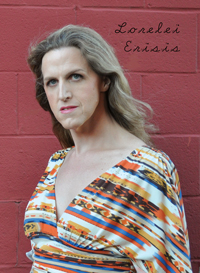By: Lorelei Erisis*/TRT Columnist—
Lately I’ve been pretty immersed in politics and activism. I’ve been trying to convince people to support and speak out for laws that are vital to the well being of trans people in Massachusetts and elsewhere. I’ve been hoping legislators will listen and that the light of truth and common decency will brighten the dark and fearful ignorance of our opposition.
And, in all this, the question I hear the most often from people who aren’t trans themselves or the cis-allies who are closest to us, is simply, “Why?”
“Why do trans people need these protections?” They ask. It’s infuriating, but it’s not really an unreasonable question. A lot of the people asking this, the legislators whose support we need for instance, are being asked themselves, and need to have answers to give.
Of course, the answer to this usually involves a bunch of statistics about how dangerous it is to be trans, how much discrimination we face, the incredible unemployment numbers, the disproportionately high risk of suicide we face and it’s all just for daring to be who we are. [pullquote]For one thing, the idea that there is a choice in being trans is a false one. If you are trans, you are trans. No amount of wishing or “reparative therapy” will make it go away.[/pullquote]
The month of November, when you will likely be reading this, is when we observe the Trans Day of Remembrance, an annual memorial for our dead in which we read the names of all those trans people who have been murdered over the previous year. It is a memorial that started right here in Boston with the brutal murder of a local trans woman named Rita Hester.
I hope that you will go to one of these memorials—read a name, listen carefully to the rest. Hear how they died and know these were human beings with full lives and people they loved or who loved them, whose lives were cut brutally short. Give them one last remembrance.
You might wonder, as you are hearing the names of the dead, reading the starkly frightening statistics, why any of us would ever transition? Why would we subject ourselves to the many potential horrors and brutalities of being openly trans in a far too often unwelcoming world? Wouldn’t it be easier and frankly safer simply to hide, to keep our secrets?
No. No it would not.
For one thing, the idea that there is a choice in being trans is a false one. If you are trans, you are trans. No amount of wishing or “reparative therapy” will make it go away. The only “choice” any of us ever have is whether to do anything about it or not; whether to actively pursue transition, or not.
And, let me tell you in this lies the answer to why we transition, despite the dangers. We do it because to not transition is often far, far more dangerous. Yes, we know the rough statistics of trans people who choose suicide, but only from those we can somehow identify as having been trans. What about all those whose suicides may never be linked to having been trans, to having kept that secret inside, eating up their will to live like a slow acid?
Or, even more insidiously, what about those who drown their secrets and their pain in the slow death of drugs and alcohol, never daring to tell the world why. Or, the ones who seek destruction by taking wild risks, who join the military, often the craziest, most dangerous branches, like the Marines or Navy SEALS or combat medics. Or they become stunt people. Or, they buy fast cars and powerful motorcycles and drive them as recklessly close to the edge as they can.
Let me be clear. Allow me to bring this right close in. I’m not talking here just about theoretical trans people here. In listing many of these examples I’m talking about trans people I know. More than that, I’m talking about me.
In many ways, I’m perhaps an ideal example of just how deeply this pain can run and how hidden it can be because my own pursuit of oblivion was never as straightforward as any of these examples.
Allow me to share some of the story of my own pain with you. [pullquote]You have power and privilege. You have the opportunity to do good and to help your neighbors. Your support can help to save lives, perhaps prevent a few more murders of trans people. You can begin to staunch the flow of blood.[/pullquote]
To begin with, I was never going to be able to simply commit suicide in any very recognizable manner. My uncle committed suicide when I was quite young. He blew his head off with a shotgun.
I never knew my uncle Skip very well, but I grew up with the specter of suicide hanging over my family. I lived and breathed all the ways it affects those who are left behind—how it never really stops hurting for any of them; how it seeps into every choice and every interaction; the tears and the grief that follow all of those left behind well into their own lives.
My Uncle Skipper removed suicide as a choice for any of us. Those of us who remained would have to find other ways to deal with our demons.
My beloved Aunt Susan, filled with pain of her own, pursued the second option: The long, slow death of hard drugs and heavy drinking. Eventually, the drugs and the alcohol did enough damage that her body simply gave up and she passed away too. Her own pain finally washed away.
But of course the survivors still suffered, still felt the lingering impact of this sad, slow suicide. I know I did.
My Aunt Susan’s death did not completely remove the option of death by drugs and drinking. In point of fact, she did not finally succumb until after I had decided to transition. I had watched her painful decline though and it made me more aware of my own tendencies to try and drown my problems in drinking and drugs.
That “choice” was not the one for me either. In addition to my Aunt Susan, I had lost too many others of those close to me to that end already. I’d seen over and over the ugliness of it—felt the pain in horrible waves.
The path I chose was most similar to the last. I was never going to join the military. My hippie pacifist upbringing had made certain of that. And, I just never had much interest in cars as anything other than a contrivance to get me from point A to point B.
But, what I seemed to have was an innate talent for was finding adventure. I was drawn to dark alleys and dangerous neighborhoods. I avoided “hard drugs,” but I was more than happy to take the strange ones! And, it was never just a little bit either.
I hung out in dangerous company. Heck, I sought out dangerous company! If there was a place I wasn’t supposed to go, I went there. I made weird choices. I chose the paths most fraught with danger. Read Warning! signs as a challenge.
If I could not rid myself of the pain of being trans through suicide or by drowning myself in drugs and drinks, then I would put myself constantly in situations where death by “pure chance” became an increasing likelihood. Somehow, I kept being extremely, almost unnaturally lucky.
But, even the best run of luck eventually runs out.
All of this was connected with the pain I felt in trying to hide who I was. It was how I coped with the feeling that I would never truly be “allowed” to be the woman I knew myself to be. It was my unconscious exit plan. [pullquote]If we do not, or cannot, transition, if we try to bury and hide our true selves, that itself is surely a death sentence. Whether it is a quick death or a long, slow one, the result is roughly the same.[/pullquote]
By the time I decided that I had to transition, that I had to acknowledge that I was a woman and begin to actively pursue a gender transition, with Hormone Replacement Therapy (HRT) and everything else, I knew very well what I was doing. I was not just killing myself. I was dying. The man I was pretending to be was falling apart and I was increasingly taking steps to make certain that, as sure as my Uncle Skip putting a bullet in his brain, my choices would kill me soon.
So, I made the only choice open to me that wasn’t in the direction of death. I made steps to begin my gender transition. I sought out help. I began the never-quite-ending process of coming out to my friends and family and as it turns out, pretty much the whole world.
Despite the dangers I knew I would face, I chose to save my own life.
So, in this way, what I am trying to tell you is that as dangerous as it is to be trans in this world—out and visible as such—it is for those of us who are trans a reduction of risk. If we do not, or cannot, transition, if we try to bury and hide our true selves, that itself is surely a death sentence. Whether it is a quick death or a long, slow one, the result is roughly the same.
This, finally, is the answer to that question I mentioned way back at the beginning of this column: “Why?” “Why should you support these protections for trans people?”
It is because we have chosen life. We have chosen to fight harder, to endure the slings and arrows of being trans in the world rather than suffer the pain and eventual oblivion of the closet.
And, now that we have made our own choice towards life, we need your help with the things we cannot control. We need your help, the help of legislators and lawyers and the just good people of our larger communities to protect us from an often still hostile and fearful world, a world that murders us and denies us basic human dignity. [pullquote]But if now, knowing these answers, you choose not to support protections for trans people? It is much as if you actively opposed these protections. Then, when you hear those names of the dead read out on the Trans Day of Remembrance, know that blood is on your hands too.[/pullquote]
For our part, we are doing everything we can to help ourselves, to lift ourselves up, to be survivors instead of suicides. But, at the end of the day we don’t have a lot of power or privilege. You have more.
Help us help ourselves.
You have power and privilege. You have the opportunity to do good and to help your neighbors. Your support can help to save lives, perhaps prevent a few more murders of trans people. You can begin to staunch the flow of blood.
Truly, you can be forgiven for not having known these things. We hide. And, you often cannot see.
Now though, you have been shown. You have been told “Why.” You have the chance and you can make the choice to help.
But if now, knowing these answers, you choose not to support protections for trans people? It is much as if you actively opposed these protections. Then, when you hear those names of the dead read out on the Trans Day of Remembrance, know that blood is on your hands too.
We have chosen life. Won’t you help us to survive that choice?
* Lorelei Erisis is an actor, activist, adventurer and pageant queen. Send your questions about trans issues, gender and sexuality to her at: askatranswoman@gmail.com.









There is a fourth path, mental illness. Basically, the stress of living inauyhentically leads to breakdowns and/or excessive consumption of psych meds. Not completely unlike the path of hard drugs, but leas illegal and sometimeaneven encouraged by friends and family.
Consider this as it applies to Suicide:
Robert Lofgren;
If you refuse to listen to the Voice of the Transgender community, and instead choose to Speak out of disdain and Ignorance, be assured that what you are saying is Killing Transgender people. To you, the issue may seem clear-cut….but it dosen’t work in real Lives.
………You are Complicit in their Deaths……..